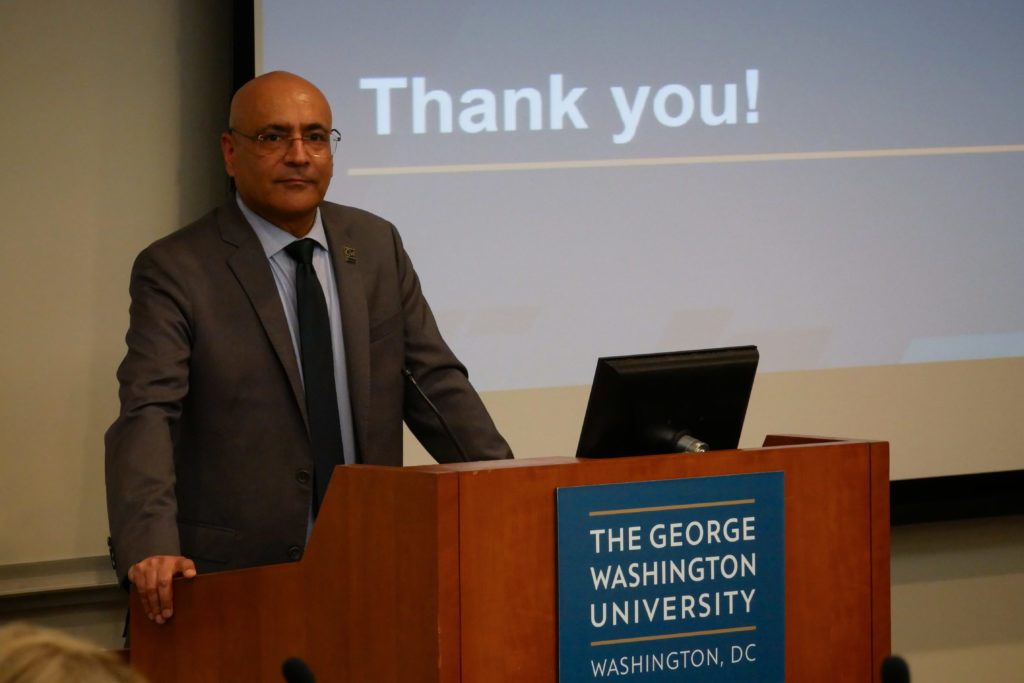Graduate enrollment in the School of Business dropped slightly this year amid annual increases in applications, officials said.
Business school Dean Anuj Mehrotra said at a Faculty Senate meeting Friday that 1,588 students enrolled in the school’s graduate programs in 2019, compared to 1,627 students last year, according to institutional data. Officials said the rise in applications and the number of incoming students are the results of “intentional” decisions to offer new academic programs.
This year marked the seventh consecutive year the business school experienced a graduate enrollment decline, down from 2,107 students in 2012, the highest graduate enrollment in 10 years, according to institutional data. The school experienced a nearly 9 percent annual increase in the number of graduate applications and admitted about 11 percent more graduate students compared to last year, according to the presentation.
Mehrotra told the senate that the increase in graduate applications is unique to GW. Most of the consistently top-ranked business schools have faced declines in graduate applications, according to an analysis by Poets & Quants, a business school news site.
“This is healthy in terms of the percentage increase from our perspective, compared to some of the peer and aspirational institutions,” Mehrotra said at the meeting.
Mehrotra attributed the rise in applications to a “reimagined” graduate education, which includes new certificate and degree program offerings customized to a student’s interests and job commitments. The changes reflect adaptations to increasing demand from students for greater flexibility in their studies, he said.
The business school now offers five Master of Business Administration formats and 12 specialized master’s degrees, according to the dean’s presentation. Administrators began offering an accelerated MBA program this fall, which packs classes into Wednesday evenings and Saturdays.
“We truly believe that if we listen to the market, and we keep the student interest in mind, this is one way the curriculum innovation is really going to help achieve those enrollments,” Mehrotra said in an interview.
Business school administrators are working to expand the school’s graduate certificate offerings – 12 credit-hour programs launched in 2017 to give working professionals the chance to learn new skills. Officials will offer 12 certificates online by next fall, and students can combine two certificates with the 12 core classes to earn a full MBA, Mehrotra said at the meeting.
Officials also promoted the school’s combined degree programs, which allow undergraduate students to double-count nine credits from their bachelor’s to their master’s degrees, throughout last academic year.
Mehrotra said the certificates – which include accountancy, artificial intelligence and sport management – allow students to customize their education to fit their interests and include cutting-edge career fields.
Mehrotra said there may be “reasonable” concern that the array of program offerings could dilute the school’s brand but added that prominent business schools, like those at Harvard and Stanford universities, have similar programs.
“With the technology and with the shifting demands of the marketplace, there is also more reason for people to have specialized knowledge early on,” Mehrotra said.
Mehrotra said business school administrators are shifting their focus to Master of Science degrees rather than MBAs to match student interest amid a nationwide decline in MBA demand.
James Bailey, a professor of management, said he has heard more calls for specialized graduate programs in conversations with students.
“Generally, this is an extremely smart move,” Bailey said. “MBA enrollments are declining worldwide. And people want those degrees – human resource management – that’s what they want to do. There’s a whole set of skills and knowledge in an MBA that wouldn’t be relevant.”
Pradeep Rau, the interim chair of the marketing department, said it is harder for some students to make the commitment to leave a job to pursue a full-time MBA program because the economy is doing well, raising the opportunity cost of acquiring a master’s degree.
“There is no question that people are looking for more focused, shorter-term exposure to material – sometimes not even with a degree,” he said.
Rau added that by attracting more students, the new programs may help increase enrollment and revenue for the school.
“If the experiments do a better job of meeting the market needs, I don’t see why that would be a bad idea to try,” he said.
The business school’s revenues and expenses are expected to hit $64 million this fiscal year – an annual increase of $3.8 million – according to the dean’s presentation. Mehrotra said one area where the school could improve is philanthropy.
“Internally, I think our pipeline for fundraising is weak,” he said at the meeting. “But I do feel all the ingredients are there in the school to be able to look for a transformative gift.”
At a town hall meeting last week, University President Thomas LeBlanc declared “world-class faculty” one of the four pillars to guide the University’s next strategic planning process. Mehrotra said improving the quality of the business school’s faculty, measured by its academic impact and publications, could help reverse the school’s decline in graduate student enrollment.
Officials hired 13 new business school professors this academic year, and the business school now employs 122 faculty, according to the presentation.
“Trying to attract the top talent is really a virtuous cycle,” Mehrotra said in an interview. “If you attract the top talent, it’ll attract the right student who will be trained well and will get placed well. So I’m driven by that desire to make sure that we are putting student interests first.”
Parth Kotak and Meredith Roaten contributed reporting.





